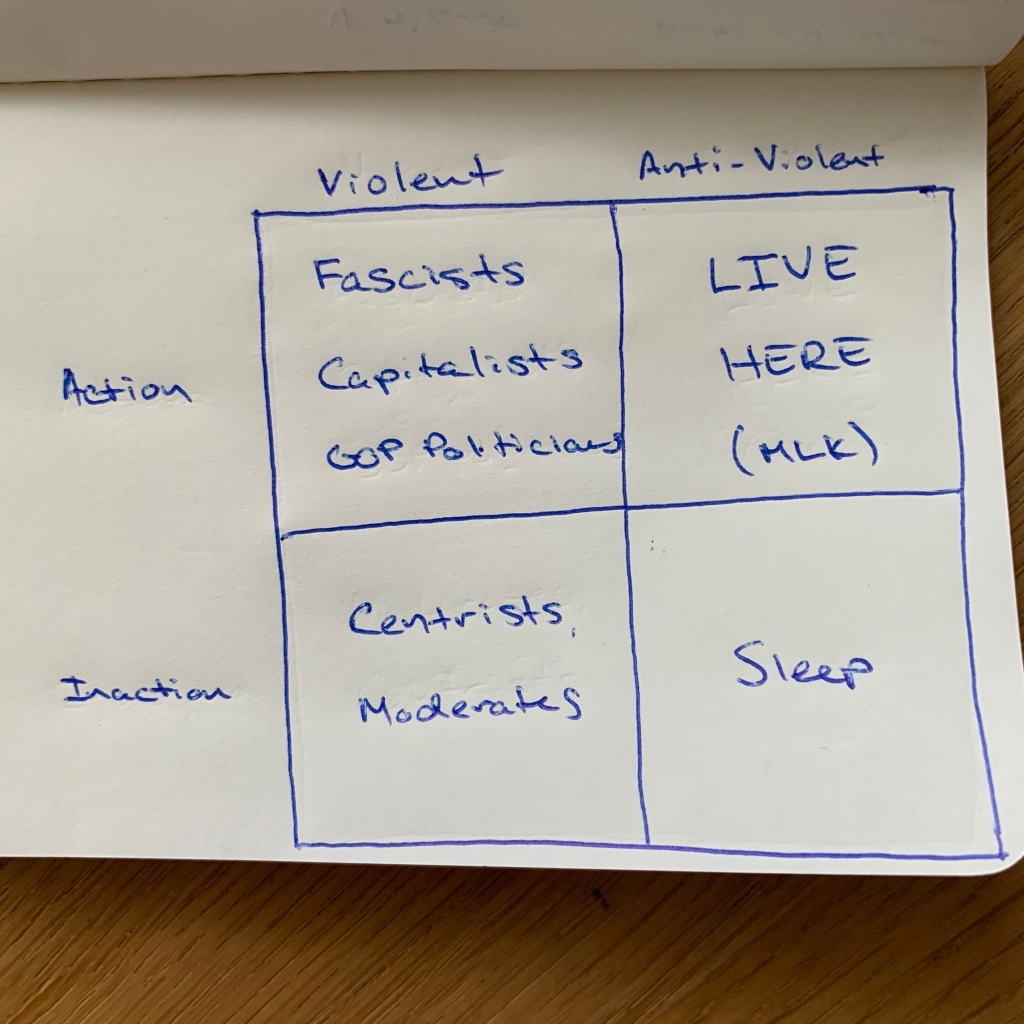
Dr. Martin Luther King, Jr. Day has been the third Monday of January since 1983. The timing of his day more or less aligns with his January 15 birthday. It’s a day off from school, but usually not a day off from your employer. We can count on some talking head somewhere excerpting the I Have A Dream speech without referring to the name of the event where it was given (The March on Washington for Jobs and Freedom) so that we’re not reminded of the continuing economic effects of Jim Crow. I will be surprised if I see a reflection on how, on a holiday to commemorate the birth of a man whose life was brutally and violently ended, it is the norm to extol the virtues of nonviolence (i.e. nonviolent protest against oppression) while staying silent on the violence that is the subject of the protests. No one will talk about police killing unarmed Black people and why they can do it with impunity, or the systematic exploitation of undocumented immigrants, or the decades-long shift of prosperity from the working class to the robber baron class, or the quotidian violence of our American caste system that keeps most people at or near desperation and in debt, where your caste is determined by the zip code in which you were born. No one will talk about the violence of our grotesque military spending, our current endless wars, or the landing on US troops in Vietnam that was happening at the same time as The March on Washington for Jobs and Freedom, a war Dr. King opposed, and the violence and injustice of that first of many US wars started under false pretenses. No one will talk about atonement, only peace and unity. What we are told to remember determines what we forget. When you forget who you are, it is really hard to do anything about it.
Dr. King knew that racial equality was related to class solidarity. He was shot and killed on April 4, 1968 standing up for that ideal. I had to look up the date. There’s no holiday on April 4th and no social media posts to “Never Forget.” Here in Indianapolis, we have the Kennedy-King Park, a place that seems more about celebrating Bobby Kennedy’s speech to a mostly African American audience the night Dr. King was murdered, sharing the news in such a way that he is credited with preventing the people from angrily taking to the streets as people did in every other city. Notice it is not King-Kennedy Park. Notice what is emphasized on their website (spoiler alert: it’s mostly about the rich, white politician. Dr. King’s assassination is mentioned only as the backdrop for Kennedy’s heroic feats of maintaining order and nonviolence.) So, we don’t remember that he was in Memphis in solidarity with the sanitary workers, who were mostly African American and organizing for fair wages and safeguards against working conditions that had led to fatalities. We don’t reflect upon the event in the context of the state of the American caste system in 1968. While Dr. King was bleeding out on his balcony for helping the oppressed Memphis sanitary workers and John McCain was being tortured after being shot down and captured for dropping bombs on people in North Vietnam, 21 year old Donald Trump, saved from the draft by a bogus medical deferment, was handed the equivalent of $1.5M in today’s dollars by his father.
Dr. King was inspired by the same things that inspired Gautama Buddha. They both led radical social justice movements against the caste systems of their day, systems that institutionalized the contempt and oppression of groups of human beings to satisfy the avarice of a few. Both saw that we don’t have to live that way. They are still right. We don’t have to live this way. The Buddha tried to help people see what he saw: that every person is a Buddha and is deserving of dignity, that we have the power to refrain from harm and mitigate harm and not abide by unjust systems, and that we need to help each other to see and and take Right Action: Anti-violent Action. Dr. King saw the same thing. “We cannot walk alone. And as we walk, we must make the pledge that we shall always march ahead. We cannot turn back.” Our fates are bound together. The struggle against injustice is never ending, but if you can struggle against it in solidarity and fellowship with others and stand up for other people, why wouldn’t you? As Dr. King said in the last public address he gave, “Let us rise up tonight with a greater readiness. Let us stand with a greater determination. And let us move on in these powerful days, these days of challenge to make America what it ought to be. We have an opportunity to make America a better nation.”
I am both proud and grateful to stand up together with you.
To the “violent inaction” cell I would add “not racists.”
LikeLike